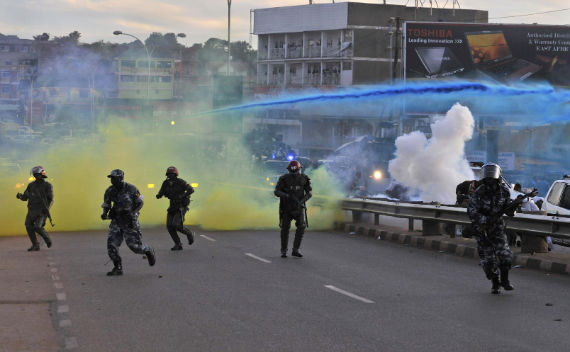Uganda: Museveni and the "African Spring"

Uganda’s most prominent opposition politician, Kizza Besigye, returned home on Sunday after seeking medical treatment in the United States for his injuries sustained by a police beating during April’s demonstrations. The government has charged him in at least three separate counts on matters related to the April demonstrations. Today, the police would not allow Besigye to “walk” away from his court hearing, presumably because it would echo his earlier demonstrations against Museveni. (However, Besigye was able to “walk” to a different court on Tuesday.) Although the large scale walk-to-work demonstrations decreased during Besigye’s absence, the initial causes—high food and fuel prices—have not. The Uganda Bureau of Statistics indicates overall inflation is the highest since 1994, and the new food crops inflation rate is 44.1 percent, up from 39.3 percent in April. More reports suggest profligate spending on behalf of the government, including the possibility of bilateral aid being used to purchase Yoweri Museveni’s private jet.
Besigye faces multiple charges related to the walk-to-work campaign, including “holding illegal assembly” and “inciting violence.” It appears that his cases have been postponed until next month in an ostensible effort to allow the prosecution to continue its investigation. Besigye is not alone in his legal battle: at least 200 Ugandans face charges stemming from the riots.
With the street protests on the decline, Museveni has attempted another crackdown on the opposition—this time a legal one. He is seeking to amend the Ugandan constitution in order to make rioting a felony charge, not a misdemeanor as it is at present. There is likelihood that Museveni will be successful. If so, demonstrators could then be held without bail for up to one hundred and eighty days. Some Ugandans are also arguing that it would largely do away with the presumption of innocence in the country’s legal system.
Observers in Uganda and elsewhere have renewed discussion about the possibility of an "Africa Spring." Besigye also stated this week that the “protests cannot die.” I wrote last month, however, about why Museveni may be able to muddle through, at least for the time being. He appears to be doing just that.
 Online Store
Online Store